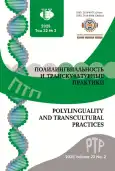Paul Boyer and the Russian-French Dialogue of Cultures
- 作者: Ovcharenko A.Y.1, Shaprinskaya E.A.1, Voropaeva J.A.1
-
隶属关系:
- RUDN University
- 期: 卷 22, 编号 2 (2025)
- 页面: 380-394
- 栏目: LITERARY SPACE
- URL: https://journal-vniispk.ru/2618-897X/article/view/326857
- DOI: https://doi.org/10.22363/2618-897X-2025-22-2-380-394
- EDN: https://elibrary.ru/RCNMZW
- ID: 326857
如何引用文章
全文:
详细
The study is devoted to the Russian-French cultural and scientific dialogue of the 17th and 20th centuries, which is of considerable interest for understanding the mechanisms of intercultural communication in the context of political and ideological challenges. In today’s world, where scientific cooperation often faces external constraints, an analysis of the historical experience of interaction between countries shows how the interaction of languages, art and ideas enriches the culture of countries. is to explore the main stages of the Russian-French dialogue, paying special attention to the role of the scientific rather than the intellectual aspect. Special attention is paid to the contribution of the French Slavist Paul Boyer, one of the founders of the Institute of Slavic Studies (Institut d'études slaves) and the authoritative scientific journal Revue des études slaves, as well as the concept of scientific and cultural exchange developed by him. The work uses scientific works on Slavic studies, memoirs and correspondence of cultural figures (D. Diderot, L.N. Tolstoy, P. Boyer, etc.). Historical and cultural analysis, comparative method and textual approach are applied to study the evolution of pedagogical and linguistic methods, Russian-French dialogue. It is revealed that the most effective forms of interaction (Paul Boyer’s textbook, based on Tolstoy’s ABC “Azbuka” of 1872) arose outside the context of the “intellectual expansion” that became widespread in France at the beginning of the 20th century, because of which institutional initiatives (the French Institute in St. Petersburg) could be distorted under the influence of ideology. In addition, the prospects of adapting historical models of dialogue (emphasis on pedagogy, authentic texts) in modern digital educational practices of teaching the language and culture of Russia are shown.
作者简介
Alexey Ovcharenko
RUDN University
编辑信件的主要联系方式.
Email: ovcharenko_ayu@pfur.ru
ORCID iD: 0000-0002-8544-5812
Researcher ID: Z-3696-2019
D. Sc. (Philology), Professor at the Department for the Russian Language and Cultural Linguistics, Russian Language Institute
10/3 Miklukho-Maklaya St, Moscow, 117198, Russian FederationElizaveta Shaprinskaya
RUDN University
Email: lizashapr@yandex.ru
ORCID iD: 0009-0004-6127-0116
Researcher ID: MGV-9836-2025
Laboratory technician at the scientific school “Linguacultural and professional communication”, Russian Language Institute
10/3 Miklukho-Maklaya St, Moscow, 117198, Russian FederationJulia Voropaeva
RUDN University
Email: voropaeva_yua@pfur.ru
ORCID iD: 0000-0002-5425-3359
Researcher ID: AAN-5202-2020
PhD, Associate Professor at the Department for the Russian Language and Cultural Linguistics, Russian Language Institute
10/3 Miklukho-Maklaya St, Moscow, 117198, Russian Federation参考
- Bakhtin, M.M. 2002. Collected Works: In 7 volumes. Vol. 6. Moscow: Russkoe slovo publ. Print. (In Russ.)
- L’ours et le coq: Trois siècles des relations franco-russe: Essais en honneur de Michel Cadot. 2000. Paris: Presses Sorbonne Nouvelle. Print. (In French)
- Lotman, Yu.M. 2002. Articles on the semiotics of culture and art. St. Petersburg: Academic project publ. Print. (In Russ.)
- Likhachev, D.S. 1973. Development of Russian Literature of the 10th–17th Centuries: Epochs and Styles. Leningrad: Nauka publ. Leningrad Department. Print. (In Russ.)
- Coeuré, S. 1999. La Grande Lueur à l'Est: Les Francais et l’Union sovietique 1917–1939. Paris: Seuil. Print. (In French)
- Cousu de fil rouge. Voyages des intellectuels français en Union soviétique. 150 documents inédits des archives russes, dir., éd. et préface par S. Coeuré, R. Mazuy. 2012. Paris: CNRS Editions, Сollection “Mondes russes”, p.9. Print. (In French)
- Uspensky, B.A. Preface. In Sohier J. Grammaire et Méthode russes et françoises. München: Verlag Otto Saner, 1987. С. 1–24. Print. (In Russ.)
- Zorin, A.L. 2001. Feeding the Double-Headed Eagle: Literature and State Ideology in Russia in the Last Third of the 18th — First Third of the 19th Century. Moscow: NLO publ. Print. (In Russ.)
- Proskurina, V.Yu. 2017. The Empire of Catherine II’s Pen: Literature as Politics. Moscow: NLO. Print. (In Russ.)
- Zannin, S.V., Kosheleva O.B. 2014. “New discoveries of Diderot’s texts: a moral catechism for Catherine the Great”. Dialogue with Time, issue 48, pp. 347–361. Print. (In Russ.)
- Mezin, S.A. 2018. Diderot and the Civilization of Russia. Moscow: New Literary Review publ. Print. (In Russ.)
- Grishchenko, N.A. 2011. “F.I. Reiff as a missionary of the Russian language and Russian culture”. Bulletin of the Irkutsk State Linguistic University, no. 2, pp. 26–31.
- Custine, A. de. 2008. Russia in 1839. St. Petersburg: Kriga publ. Print. (In Russ.)
- Gamalova N. “Mélanges pour le centenaire de la slavistique lyonnaise”, 1920–2020. Modernités russes. URL: https://publications-prairial.fr/modernites-russes/index.php?id=615 (date of access: 03.03.2025). (In French)
- “Meyerhold and France. Publication, introduction article and comment by O.N. Kuptsova”. 2009. Mnemosyne. Documents and facts from the history of Russian theater of the twentieth century. Issue 4. Moscow: Indrik publ, pp. 741–796. Print. (In Russ.)
- Apukhtina M. 2019. L’influence des didacticiens russes sur la formation des professeurs de français et sur l’enseignement du français en Russie. Université Côte d’Azur. Print. (In French)
- Espagne, M. 1993. Le paradigme de l’étranger: les chaires de littérature étrangère au XIX-e siècle. Paris: Cerf, pp. 315–319. Print. (In French)
- Leo Tolstoy’s Aesthetics. Collection of articles edited by Sakulin, P. N. 1929. Moscow: State Academy of Artistic Sciences. Print. (In Russ.)
- Polonsky, V.V. 2019. Gallo-Rossica: from the history of Russian-French literary relations of the late 18th — early 20th centuries. Moscow: IWL RAS publ. Print. (In Russ.)
- Gladkova (Kalyuzhnaya), L.V. 2023. “L.N. Tolstoy and his French-speaking correspondents on art. Reception of the treatise ‘What is Art?’ in France.” Literary fact, vol. 30, no. 4, pp. 253–267. Print. (In Russ.)
- Pakhsaryan, N.T. 2010. Victor Hugo and Leo Tolstoy. In: Leo Tolstoy and his contemporaries. Moscow: Parad publ., pp. 167–169. Print. (In Russ.)
- Konstantinov, N., and A. Petrov. 1957. Preface to the twenty-first and twenty-second volumes. In: Tolstoy L.N. Complete collected works. Vol. 21. Moscow: GIHL, pp. 5–38. Print. (In Russ.)
补充文件









